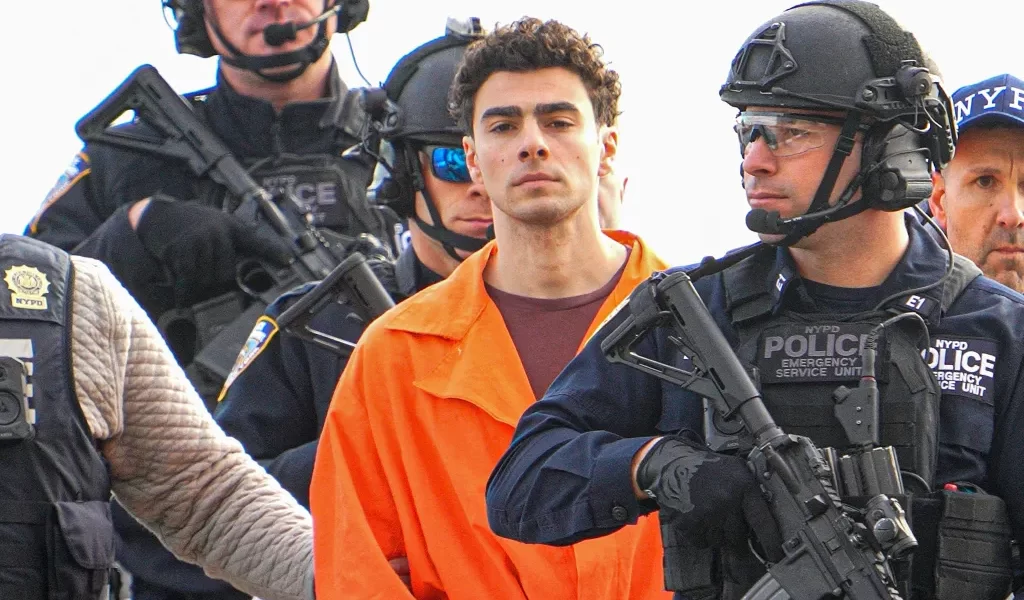Luigi Mangione, a 26-year-old app developer, has been charged with the murder of UnitedHealthcare CEO Brian Thompson, and the reactions have been anything but subtle. On December 4, 2024, outside the New York Hilton Midtown hotel—an appropriate venue for discussions on profit margins over human lives—Thompson met a fate many argue was long overdue. While his death was undeniably tragic, let’s not pretend the man wasn’t part of a machine that left countless others fighting for their lives, or worse, dying without access to basic care.
The Crime and Arrest: A Bold Statement?
Mangione was arrested on December 9, 2024, in Altoona, Pennsylvania, armed with a 9mm ghost gun, fake identification, and a manifesto that might as well have been titled “Dear Healthcare Industry: This Is Why You Suck.” In it, Mangione reportedly lambasted the health insurance sector for prioritizing profits over people, highlighting skyrocketing premiums, denied claims, and opaque practices.
Authorities believe Mangione targeted Thompson as a symbol of the greed and corruption he saw in the healthcare system. And while violence isn’t the answer (we’re all obligated to say that, right?), one has to wonder how far someone has to be pushed before they decide it’s their only option.
The Manifesto: Rage with a Side of Truth
Mangione’s manifesto reads like the diary of every frustrated American who’s ever been denied healthcare because their illness didn’t fit into a pre-approved spreadsheet. It laid bare his grievances against an industry that profits off suffering.
He shared a personal story about a family member who struggled to access life-saving treatment due to insurance denials—a story that’s unfortunately all too familiar. How many Brian Thompsons did it take to get here? How many lives were quietly buried under paperwork stamped “denied” before one person decided to make noise?
Law enforcement described the manifesto as “angry, accusatory, and deeply resentful.” Perhaps the same adjectives could be used for every family mourning someone who couldn’t afford the care they needed.
Public Reaction: Outrage, Shrugs, and Memes
The public reaction to Thompson’s death has been a mix of outrage and apathy. Some condemn Mangione’s actions as barbaric, arguing that systemic issues require systemic solutions. “Violence is never the answer,” tweeted one user, while likely ignoring the silent violence of a system that bankrupts families for daring to get sick.
Others, however, have made no effort to hide their schadenfreude. Social media has been flooded with memes poking fun at the idea of Thompson as a martyr. “Brian Thompson: gone but not forgiven,” one viral post read. Another commented, “The guy was probably trying to deny Luigi’s ghost gun as an out-of-network expense.”
And then there are those who see Mangione not as a hero but as a symptom. “This is what happens when people feel unheard,” one Reddit user observed. “When you’re backed into a corner, you fight back.”
The Bigger Picture: A System That Creates Its Own Monsters
While Mangione’s actions cannot be justified, they also cannot be divorced from the larger context. The U.S. healthcare system is a labyrinth of high costs, denied claims, and impenetrable bureaucracy, leaving millions frustrated and desperate. Mangione didn’t invent this broken system; he just picked a more extreme way to point it out.
Healthcare advocates are seizing this moment to call for reform, urging policymakers to address the systemic failures that breed this kind of desperation. But for many Americans, the damage is already done.
“This isn’t about one man or one company,” said a healthcare policy expert. “It’s about a system that has failed to prioritize human dignity. If we don’t fix it, there will be more tragedies—on both sides.”
As Mangione awaits trial, the details of his motivations will undoubtedly spark further debate. His defense may argue for leniency given his personal experiences and the emotional toll of systemic injustice. Meanwhile, the prosecution will likely focus on the premeditation behind the crime, framing Mangione as a cold-blooded killer.
But let’s not lose sight of the bigger question: how did we get here? How did we create a system so broken that someone thought this was the only way to be heard?
Brian Thompson didn’t deserve to die, but neither did the countless people who couldn’t afford their medications, lost loved ones to denied treatments, or had their lives reduced to line items on a balance sheet. Mangione’s actions were extreme, but the frustration he felt is shared by millions.
If there’s anything to take away from this tragedy, it’s that the system needs to change—before it creates more Mangiones. Violence isn’t the answer, but neither is ignoring the cries of those who’ve been crushed under the weight of a broken system.
